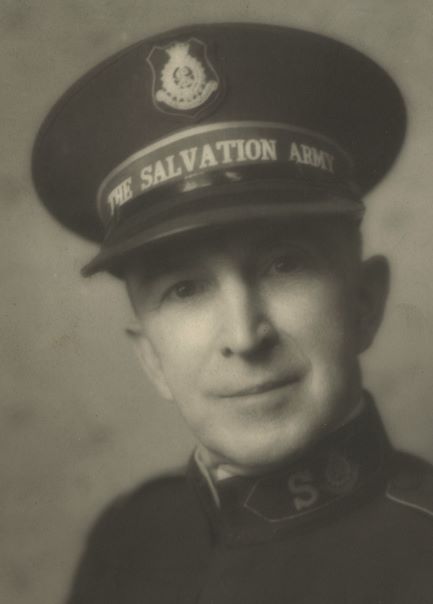COLONEL WALTER PEACOCK
Colonel Walter Peacock, a well-respected Canadian Salvation Army officer, designed and introduced the ‘Red Shield’ into the Canadian-held trenches in France in 1915. It was an easy way to indicate his position to servicemen needing support or counseling. It was adopted worldwide soon after.
Born and raised in The Salvation Army, Walter started his Army career as a lad in the Editorial Department at Territorial Headquarters. As years went by the boy became a bigger boy, and in 1901 he was invested with Officership, given the rank of Probationary Lieutenant, and appointed to the Trade Department at Territorial Headquarters.
But he did not forget, while working on the Territorial building, that his chief calling was that of soul-winning, so the young man joined himself to a city Corps in Toronto, and became Young People's Sergeant-Major of, the Temple.
In addition to this position he was a member of the Staff Band, in which he played side drum for a number of years.
Followed an appointment to the new Ontario Divisional Office and promotion to the rank of Ensign. Then came transfer to the Immigration Department, in connection with which important work he crossed the Atlantic eight times.
In 1909 he was appointed Private Secretary to the Chief Secretary, who is the present Chief of Staff, Commissioner Henry W. Mapp. His next appointment was Chancellor of the Northwest Division, with Headquarters in Winnipeg. While in this position the Colonel became deeply interested in the work of the young people, by which means he equipped himself in a marked manner for tasks which at a later period were committed to him as the first Territorial Young People's Secretary for Canada West Territory.
In February 1919, he was appointed Men's Social Secretary for the Canada West Territory, though previous to this he was engaged in organizing financial campaigns at the large centres throughout the Territory. Under the badge of the Red Shield he accomplished some commendable work in these financial efforts.
When Canada West was to publish its own edition of "The War Cry" Colonel Peacock was given the responsibility of its production, and for three months he filled, with considerable credit, the chair of Editor, in addition to his duties as Men's Social Secretary, being assisted for a time by Lieut-Colonel Phillips.
For six years he was Young People's Secretary for the Central Territory, U.S.A., endearing himself to the hearts of the young people for whom he devotedly labored and winning for himself the esteem and commendation of every Officer. Out of his fertile mind many of the young people's activities became standardized in the Central Territory.
In 1927, honored by an advance in rank, the Colonel was appointed Field Secretary for the newly- created Southern Territory of the United States.' In due course Lieut.-Colonel Walter Peacock returned to Canada West, where also he acted as Field Secretary, with which position he combined that of Territorial Young People's Secretary.
With the amalgamation of the two Territories he took the position of Divisional Commander for Montreal and Ottawa, where he won a warm place in the hearts of Officers and Soldiers alike. From that appointment he assumed the Field Secretaryship for the whole Dominion.
Colonel Peacock acknowledges with pride the devoted support which he has received from his wife, 'who before marriage was Captain Jennie Chislett, daughter of Salvationist parents of North Sydney. For seven years as Captain Chislett she commanded a succession of Corps with recognized ability and with entirely selfless effort. She has since been her husband's helpmeet in the exalted manner that is Divinely intended and has ministered greatly to the Colonel's success. As wife, as mother, as warrior, as counsellor she has proved herself abundantly worthy.
CANADA AND BERMUDA TERRITORY
COLONEL WALTER PEACOCK

Chief Secretary
ASSUMED OFFICE: March 5, 1937 to July 1, 1945
PRECEDED BY: Colonel William Dalziel
SUCCEEDED BY: Colonel Archibald Layman





